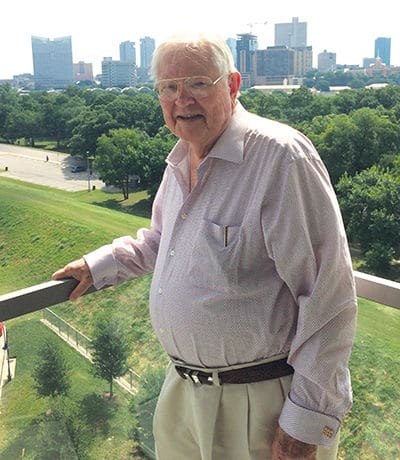What retired Maj. Gen. Chester “Chet” McKeen considers one of his most important contributions in his military career came from an observation while he was a young lieutenant stationed on Iwo Jima in the last days of World War II.
Iwo Jima, about 575 miles from Japan in the Bonin chain, was captured by U.S. Marines in early 1945 for use as an advanced airfield where B-29 bombers returning from raids over Japan could land and refuel or if they were damaged without having to fly to their home base in the Marianas. McKeen was a member of the 362nd Anti-Aircraft Ordnance Company, assigned to the island because the Marines did not have anti-aircraft units.
He noticed how much difficulty heavy trucks had climbing hills in the soft volcanic ash that blanketed the island. Years later, as deputy commander of the U.S. Army Tank-Automotive Command (TACOM), he would fix that problem.
“I got to work with a guy from Teledyne, and we took a truck and changed the tires,” McKeen said. “Instead of duals on the back, we had large high flotation tires and we put an automatic transmission in it. We fixed it so that you could start out in low gear and you could shift in sand and volcanic ash. The truck would shift to the most efficient gear and go right up the hill.”
That led to a $30 million modification program for 2 ½ and 5 ton trucks. “And we had those new trucks for Desert Storm,” McKeen said. That meant that U.S. tanks and troops could be rapidly re-supplied. “Those trucks would keep up. The older ones would not.”
Flipping through old photos in his residence at The Stayton recently, McKeen recalled battles — in combat and conference rooms — that highlighted 35 years of military service. He also remembers pleading with his parents to stop moving. His father was supervisor of station services with the Baltimore and Ohio Railroad.
“My father’s job meant we moved a lot,” McKeen said. “We went to 11 elementary schools, and finally my sister and I just revolted and said we want to get through high school in one place.”
McKeen was a sophomore at the University of Illinois in Champaign-Urbana and already involved with ROTC when he enlisted in the Army in 1942. “My dad supported my decision, but my mom did not,” McKeen said. “I never regretted it. Not once.”
McKeen, 93, and his wife, Sally, live on the seventh floor of The Stayton in a unit overflowing with souvenirs from military tours and more recent vacations. From Persian rugs and framed medals to a globe covered with colored thumbtacks, the home is a snapshot of a life lived to its fullest.
McKeen served in Europe after the war and married his first wife, Virginia Pierce – “the girl next door,” McKeen said – in 1954. She passed away in 1998. He and Sally had known each other from years of service on charitable boards, and they married in 1999.
McKeen earned bachelor’s and master’s degrees at night during his active duty career.
“It took 15 years to do that,” said McKeen.
McKeen served as a production planning control officer in 1947 at the Frankford Arsenal in Philadelphia, and developed a production-control system using IBM punch-card technology. From 1954 to 1956, he was chief of the management section in the Comptroller Branch, Ordnance Division. Charged with improving the division’s supply functions, McKeen developed a centralized stock-control system using linked electrical accounting machines to track more than 140,000 items in French and German depots.
McKeen served two tours in Vietnam in 1960 and 1970, where he supervised trucking, depot and port operations, as well as ship and engine repairs. From there he became deputy commander of the U.S. Army Tank-Automotive Command (TACOM), and spent the final years of his career in charge of tank production acceleration and later as commander of TACOM. In that role, he helped accelerate production of the M60 tank and upgrade the M48 series tank to the M48A5. Both programs were completed ahead of schedule and under budget.
After retiring in 1977, McKeen worked in Iran with Bell Helicopter until the Iranian Revolution of 1979, then returned home to serve as Bell’s vice president of material until 1989.
He’s philosophical about the Fourth of July and about military service.
“We were given what amounted to a Garden of Eden by the founders of the country,” McKeen says. “Trying to preserve that is worth anything it costs. What we celebrate is the birth of the nation.”
He notes that the men who wrote the Declaration of Independence and the Constitution were Greek scholars, and that puts a slightly different interpretation on the “pursuit of happiness” phrase in the declaration.
“Aristotle said that one of the principle goals in life was to find happiness,” McKeen said, but Aristotle didn’t define it in modern terms of “joy from dope or joy from dancing or joy from singing or going to the theater.” The Greek philosopher saw happiness as a life spent performing the necessary duties and treating other people well.
“His idea of happiness was, in essence, fulfillment,”
McKeen said. “This idea found its way into the Declaration of Independence. This is what the guys were looking at when they started the country. So the Fourth of July really has pretty solid meaning.”
And that applies to the role of government as well.
“The people who wrote the Declaration of Independence and the Constitution said, ‘We get our rights from God and we have what government we need to take care of the common functions,’ ” McKeen said. “We have to protect what we were given, if we are smart. We are the ones who are responsible for ourselves, and the government is responsible to us according to the Constitution.”
Paul Harral contributed to this article.






